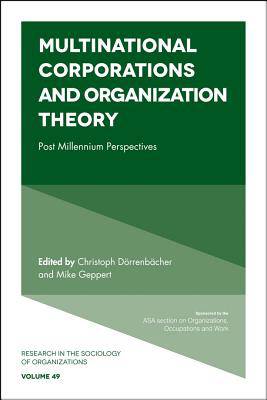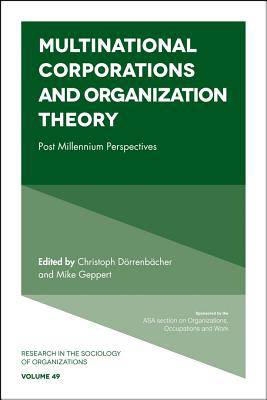
- Afhalen na 1 uur in een winkel met voorraad
- Gratis thuislevering in België vanaf € 30
- Ruim aanbod met 7 miljoen producten
- Afhalen na 1 uur in een winkel met voorraad
- Gratis thuislevering in België vanaf € 30
- Ruim aanbod met 7 miljoen producten
Zoeken
Multinational Corporations and Organization Theory
Post Millennium Perspectives
€ 139,45
+ 278 punten
Omschrijving
The study of multinational companies (MNCs) has been split for many decades into two camps which hardly 'talked' to each other: a) predominantly economic and functionalist oriented International Business Researchers, and b) largely social constructivist and critical management oriented Organization Theorists. This volume intends to build bridges by bringing together leading international scholars from both camps, who provide new insights in the study of MNCs. In addition to the bridge-building exercise, the book aims to develop a more comprehensive organizational theoretical understanding as well as methodological plurality in the study of how MNCs function in the post-millennium era, both internally and externally, and also how they control their international operations across economic, institutional, cultural, linguistic, political and social divides. Key topics addressed in our volume include: historical perspectives on the study of MNCs, the role of increased financialization and marketization on MNCs, the new role of the HQ within contemporary MNC, the role of language in MNCs, discursive studies of MNCs, labour representation in MNCs as well as social movements and corporate social responsibility and MNCs.
Specificaties
Betrokkenen
- Uitgeverij:
Inhoud
- Aantal bladzijden:
- 528
- Taal:
- Engels
- Reeks:
- Reeksnummer:
- nr. 49
Eigenschappen
- Productcode (EAN):
- 9781786353863
- Verschijningsdatum:
- 24/02/2017
- Uitvoering:
- Hardcover
- Formaat:
- Genaaid
- Afmetingen:
- 150 mm x 231 mm
- Gewicht:
- 1020 g

Alleen bij Standaard Boekhandel
+ 278 punten op je klantenkaart van Standaard Boekhandel
Beoordelingen
We publiceren alleen reviews die voldoen aan de voorwaarden voor reviews. Bekijk onze voorwaarden voor reviews.










